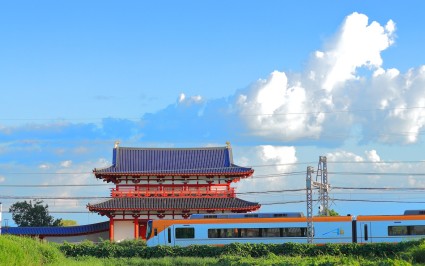The government is sowing money, hoping it will sprout children. It won’t, says Shukan Gendai (July 1-8).
Huge sums are involved and much is at stake. Various new family allowances add up to 3.5 trillion yen a year over three years. It’s a whole “different dimension,” says Prime Minister Fumio Kishida – justified, he says, as Japan’s “last chance” to reverse its precipitously declining birthrate.
Japan’s demographic “inverted pyramid” – the elderly overwhelmingly outnumbering the young (36.2 million over 64 versus 14.4 million under 15) – has been taking shape for decades. Other advanced nations travel the same road but more slowly. The rewards of modernity – vastly extended life spans coupled with all the new and dazzling things there are to do besides have and raise kids – are proving mixed blessings.
Never before in history – Japan’s and the world’s – have so many people living so long had so few children. In Japan in 2022 roughly 770,000 babies were born – as against 2.09 million in 1973 and 2.7 million in 1949.
Three million Japanese died in World War II. The nation itself had nearly died. The carnage over, the stunned apathy of defeat in part overcome, life regained a foothold. The nation revived and couples bred. Households, streets, schools, parks swarmed with children. The air rang with children’s voices. This was the first baby boom. The second came, inevitably, in the 1970s. The third never happened.
It was aborted, and Shukan Gendai relishes the irony. Half a century ago the expert, official and popular talk – in Japan and worldwide – was of population explosion. Our swelling numbers were a threat to the food supply, a drain on the environment. The oil shock of 1974 drove the point home. In Japan that year a government-sponsored Conference on Population recommended limiting births to two per household. A legal limit was never imposed. It didn’t have to be. The birth rate decline began then.
Earlier events had foreshadowed it. Occupied Japan’s population explosion alarmed the U.S.-led occupying powers. Would Japan be able to feed itself? Given a food crisis, real or imagined, would Japan once again turn militarist and invade its neighbors? Concern was such that the Occupation pressed the Diet to legalize abortion. That done, the 2.7 million births of 1949 fell to 1.75 million by 1955, rebounding only when the baby boomers came of age. No similar coming of age looms now.
The government’s fatal error, in Shukan Gendai’s view, is its exclusive focus, for all its “different dimension” talk, on one dimension, the economic. Certainly money is important. Earnings are low, jobs insecure, and child-rearing costs soaring, particularly those related to education. Children’s futures in a high-tech economy depend on long, intensive, expensive education. Couples unable to provide it may well decide it’s better not to have kids at all. (The average income of households with children is 8.14 million yen, up from 6.73 million 10 years ago; children have become “a luxury item,” the magazine comments.) Government payouts, generous as never before and in that sense truly a “different dimension,” may help offset that thinking.
But what of other dimensions – social, psychological, environmental? The bottom line is, why have kids? Lifestyles other than marriage, sexuality transcending two genders, asexuality, new pleasures, new enjoyments, new distractions, new freedoms, all conspire to make child-rearing seem rather dull in comparison, an oppressive crimp on life’s vastly expanding possibilities and potentials; and besides, global warming threatens the planet’s very existence. How long has the human race got, after all? Selfish considerations aside, is this a world to bring children into? In Japan as elsewhere, young adults are saying no and acting accordingly. Money isn’t likely to change their minds.
It’s a current sweeping the whole developed world. Japan’s birth rate is conspicuously low, but in no developed country is it high, and in few rising. Shukan Gendai finds one exception – one developed country where the birth rate is just high enough to perpetuate its current population: Israel.
What’s the answer, then? Immigration? Immigrants from less developed countries do tend to have higher birth rates – for one generation. The second generation merges with the general population and becomes in effect one with it, adopting its lifestyles and reproducing at its pace. Expanded tolerance of and support for children born out of wedlock? France is generally cited as the model to follow here – and yet lately France’s birthrate too is falling.
So good luck to the government with its “different dimension,” Shukan Gendai says in effect. Ill-considered, costly and ultimately futile attempts to jack up the population, it says, will only distract us from the one constructive thing we could be doing: accepting population decline as inevitable and devising strategies to adapt to it.
Michael Hoffman is the author of “Arimasen.”
© Japan Today














29 Comments
Login to comment
virusrex
Population decline It may not be actually "inevitable", but considering the way the Japanese government does things and how unlikely this is to change it can be said to be realistically impossible to avoid.
The problem is that it is also realistically impossible for politicians to accept this, so the only option left is to throw money at the problem and pretend this will solve it even if the same approach has failed before.
YeahRight
I've tried to do my part. We had three children and are expecting our first grandchild next January.
GillislowTier
I mean if they have know this was an issue for 30 years and still have not made tangible moves towards fixing it while also setting plenty of meetings and panels to discuss solutions….
fool me once, fool me for 30+ years something something
NAM
They have less a birthrate problem, and more a social skills and free time problem. Lots of people I meet have wanted to have kids, but they never found the right person. And they hardly date, because they're working all the time. Then they are exhausted, and never have time to ask people out, go on dates, etc. Everyone here is running on empty, so to speak. They also want some ideal situation in which to bring kids into, whereas there never really is an ideal time! There's always going to be some reason to delay having kids, until it is too late.
I don't see the baby problem getting solved until the work culture changes. There is no reason to regularly stay at the office past 6pm.
Eastman
NAMToday 12:39 pm JST
They have less a birthrate problem, and more a social skills and free time problem. Lots of people I meet have wanted to have kids, but they never found the right person. And they hardly date, because they're working all the time. Then they are exhausted, and never have time to ask people out, go on dates, etc. Everyone here is running on empty, so to speak. They also want some ideal situation in which to bring kids into, whereas there never really is an ideal time! There's always going to be some reason to delay having kids, until it is too late.
I don't see the baby problem getting solved until the work culture changes. There is no reason to regularly stay at the office past 6pm.
BEST COMMENT today so far.
I could not agree more.Change work culture as first.To have time to live too-not just to work.
Youmad Brough
This guy has swallowed all the liberal talking points hook, line, and sinker.
The author lives in a world where he thinks couples sit down to discuss whether they want to have kids or not like this: ”I would love to have a child, but you know honey, we’re all just going to die from global warming so it’s probably not a good idea.”
Redemption
Same problem in every developed country. I think Italy will be gone soonest, along with South Korea. The survivors will be those countries that can assimilate immigrants, and I think Japan is doing a reasonably good job of that.
TaiwanIsNotChina
Uh, you don't win points for assimilating immigrants when the numbers are comically small...
xin xin
If govt don't do things there will be other complaints, probably by the same people. So doing something is OK and helping some young people to have kids is fine, just don't be too hopeful. New Zealand, not much smaller than Japan in land area, has a population below 6 million. Not a bad place to live. Japan can do ok with just half its current population. Its just that the transition is painful.
La vie douce
The survivors will be those countries that can assimilate immigrants, and I think Japan is doing a reasonably good job of that.'
Good one...lol...you need to get out of Japan a bit more to see what a reasonably good job ' of assimilating immigrants looks like. Because you sure aint gonna see it in here.
TaiwanIsNotChina
That's like saying a genocide is painful, no offense. What is Japan going to do when the elder care system collapses? I'm not sure every young person wants to sign up to be an orderly, either.
GBR48
The future is grim. High prices, shortages, bans on everything from travel to tech, extreme climate, increasingly limited opportunities for employment or social mobility. A certain cold war and WWIII more than likely. Why bring kids into such a world? Plus, each child is a lifetime of carbon emissions laid at your door.
Immigration may slow the decline a little. Countries that go out of their way to block it like North Korea and the UK will decline the fastest, and show everyone else what is in store for them down the line.
The concern about population decline is economic and political. Our planet is wildly overpopulated - hence all the emissions and pollution. When food runs short in developed countries, as it often does in undeveloped ones, a smaller population will actually be something of a blessing.
suomitheway
I am not seeing it in France, either.
Tamarama
Interesting article. I think you can simply scratch immigration in the immediate term as a solution - Japan doesn't want it. I think Japanese people would prefer a smaller, 'purer' Japan, rather than a multicultural one.
The LDP has allowed this manic work culture to literally control Japan and its families - it's a social monster that handcuffs the population to their work desks, and has done for many for decades. With the costs and time associated with raising kids into an uber competitive world where they themselves have to start almost as infants on programs like Shimajiro and Kumon then later Juku, music, sport, private school fees, university fees etc etc just to keep up with their peers, before the inevitable entry into the same oppressive, monotonous working life, people are asking themselves 'Do I really want my children to have to go through this? Is this really what life is?' Having children is one of life's great joys. Watching them suffer is not.
The LDP just trying to throw money at the situation shows just how disconnected and out of ideas they really are. They are part of the problem, not the solution, and people know this. But there is no way they are nimble or responsible enough to change.
Therefore, the halving of Japan's population by 2100 is inevitable in my opinion.
shallots
This writer has no suggestions really. That would be OK normally. “We should give up trying.” Well, OK, what then? When half the country is retired and hanging around hospitals, what will be done to pay for it all? Um, immigrants AREN’T a solution? Rude awakening: they’re already here. And it’s just the beginning. At least he didn’t try to say robots would fix the problem.
Peter Neil
The planet's very existence? That sounds like something a 14-year old would write.
Global warming ain't nothin'. Wait 'til you see what the sun does to the planet when it expands in about 3 billion years.
TrevorPeace
One thing about trying to grow Japan's population that simply won't work is immigration. I hate to say it, but in my opinion - and this is from personal observance during my many trips to the country - 'mixed-race' families in Japan are generally considered some kind of cancer. And I've seen corroborating comments from several writers on this website. On top of that, I doubt that people who want to leave their third-world countries will consider Japan as a hopeful destination. They've been inundated with the thought of a 'better life' in the US or Europe. And not only is the language barrier easier to overcome than trying to learn Japanese, but in other countries the different cultural diasporas actually group together and aren't forced to assimilate for fear of rejection or racism. Yes, rejection or racism exists everywhere, but not so much as in Japan.
1glenn
Government policies supporting mothers trying to have and raise a child or children might go a long way towards reversing Japan's population decline. As it is now, anyone choosing to have a child has to consider the possibility of descending into poverty as a result.
Ricky Kaminski13
Memo to everyone. Nothing is inevitable, only to those with a lack of vision.
Cristian
Accepting a declining population is not possible. Japan's economy would simply colapse and everyone would stop receiving benefits like health care and pensions.
Policies to increase the birthrate are therefore not only necessary but very much critically important.
"Throwing money at the problem" is definitely not good enough but also is MUCH better than not doing anything.
As others have mentioned, improving working culture is also a critical step.
Regarding immigration japan is not a very appealing nation for most people vs moving to other developed countries.
However, it does have many ways to potentially change that.
The introduction of digital services must become widely implemented to increase efficiency and also make english and other languages available for most processes.
Immigration policies must change to create a realistic path to permanent residency and citizenship.
All in all many things have to change to make a significant change but none of them are impossible to achieve. As long as there is political willpower.
commanteer
Sheesh. Your "many trips to the country" didn't teach you much then. Are you repeating what other frequent visitors told you in some Roppongi gaijin bar? Neither my family nor any mixed family I know would agree with this.
Sven Asai
Of course a turnaround is possible immediately. It’s just not really wanted and the much talking about it only won’t solve the problems.
Strangerland
Because stable society can turn around immediately on topics, right?
And when does that ever happen other than war, famine and pandemic?
Hikikomorii
This is the Japanese problem-solving method called しょうがない
mikeylikesit
Umm…France is a positive model for this? France has spent the better part of the last month on fire as those second- and third-generation children of immigrants riot. Assimilation has never been that sudden or simple.
Legrande
Raising children requires not just the desire to have children (questionable amongst the current generation) but also the guts and will to grind and persevere through all the messy trials and tribulations that come along with child-bearing, in addition to the formidable costs...are today's smartphone generation up to the task?
fxgai
Huh?!
W, what?!!
Wwwwwwhat?!!!!
1glenn
Ideologically it may be anathema to many on the Right, but take a look at policies in the Scandinavian countries toward young parents trying to have children. Japan could learn something. We have cousins who said that either the mother or father could take a year off with pay following the birth of a child.
One thing Japan and Scandinavia have in common is a love of their children. What is different is how the government treats young parents and children.
Aly Rustom
I agree. Well said Trevor.